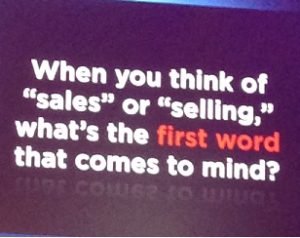Bestselling author Daniel Pink was a keynote speaker at the American Council of Engineering Companies Annual Convention. He told us that his talk would follow a format of 2, 3, 4. Two points, then three points, then four points. AND that this information would be applicable to everyone in the room. He fulfilled his promises, leaving each of us with new tools to grow our businesses.
Daniel Pink is a curious guy. So it just makes good sense that he would ask a few questions to satisfy that curiosity. He wanted to find out what people do all day, so he asked them a (seemingly) simple question:
“What percentage of your work involves convincing or persuading people to give up something they value (attention, effort, money, time, etc.) for something you offer?”
What he learned is that, “Like it or not, we’re all in sales now.”
 Next up on his list of questions was this: When you think of sales or selling, what’s the first word that comes to mind?
Next up on his list of questions was this: When you think of sales or selling, what’s the first word that comes to mind?
Queue the negative responses – wow. We’ve got a bias against sales. There was a 4 to 1 ratio of negative to positive responses to the question. Since we’re all selling, this is pretty disturbing. Pink pointed out two key features of today’s sales world:
- We’re all selling all the time. Each employee serves as a representative of the company. Every impression moves a prospective customer / client closer to or further from purchase.
- We’re doing that selling on a re-made landscape: seller beware. Buyer Beware used to be the name of the game back in the day before online information leveled the playing field. Now the buyer enters negotiations with no less information than the sales person. Think about buying a car here – 20 years ago, the car salesperson held all the cards; that’s no longer the case.
This is a really interesting situation we’re in. We all sell. Yet we have all these negative thoughts spinning in our heads about sales and sales people. Pink surveyed some of the top business schools and found that most do not teach sales. What??? Very interesting indeed. Looking at data that’s available through a number of studies, Pink explored qualities of successful sales people and found there are three key elements that make us more effective in our sales efforts:
- Attunement – the ability to get out of your own head and into your client’s head. What will this do for you? It will allow you to see the situation from someone else’s perspective and find common ground.
- Buoyancy – the ability to stay afloat in the ocean of rejection sales people face every day. A key factor here: self-talk. Check yourself. Is your self-talk encouraging or discouraging your sales efforts?
- Clarity – the ability to curate information. In this world of information overload, it’s important to be able to separate what matters from what doesn’t. You want to be the person who can identify the problem to be solved before it surfaces.
Want to take some steps to ensure your sales increase? Of course you do. More data, more suggestions from Pink:
Continuing on with his review of data, Pink investigated whether introverts or extroverts would be more successful at sales. What do you think? Introverts? Extroverts? The advantage here clearly goes to ambiverts: those people whose personalities include a balance of extrovert and introvert features. Think about this when hiring your sales force and avoid the extreme introverts and extroverts. Here are four tips to improve your sales efforts:
- Have you ever been told that you should mimic the person you’re talking with so that they’ll feel that you understand them? Good advice or garbage? This would be good advice – mimicry is clearly effective in closing sales. The caveat here: don’t be “an idiot about it.”
- Dump the technical jargon. Use your client’s language and don’t make them feel uneducated by correcting their technical language.
- Show some social proof if you want to change your client’s behavior (to buy your product). North Americans tend to exaggerate the importance of personality and under value context. Context drives behavior more than we realize, so make it easy for your clients to take action. Pink suggests we ask ourselves: Have I built an off-ramp? An especially apropos question for a roomful of engineers.
- Pay attention to others’ posture, gesture, and language. Then reflect those back without being an idiot about it.
Living up to his assertion that we’re all in sales, Pink followed his talk with a book-signing session. And, yes, I hopped in line after buying To Sell is Human. I suspect it will be a valuable sales tool. What are your favorite sales tips and tools? Let me know in the comments below, or connect with me directly.
 The smiles remained for three of the four, but the younger boy was in tears as they headed back toward the hotel. This was the exchange between the young boy and his mom.
The smiles remained for three of the four, but the younger boy was in tears as they headed back toward the hotel. This was the exchange between the young boy and his mom.




